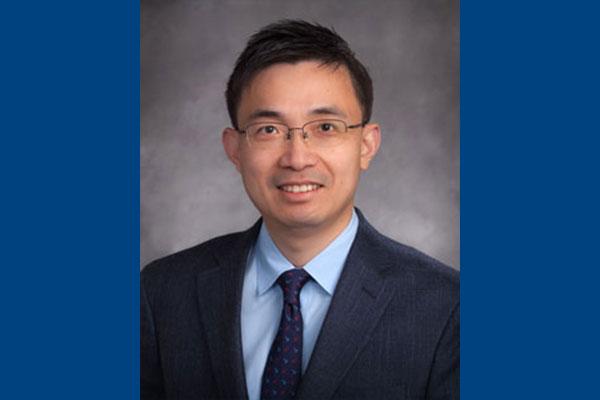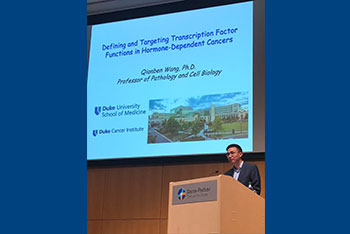
On Oct. 10, 2023, Qianben Wang, PhD, delivered a compelling lecture titled “Defining and Targeting Transcription Factor Functions in Hormone-Dependent Cancers” at the Harvard Medical School's Dana-Farber Cancer Institute Seminar in Oncology.
For over two decades, the Seminars in Oncology has featured national and internationally-renowned research-oncologists, who present on a myriad of cancer research and treatment topics to an audience of faculty and medical fellows from Harvard-affiliated institutions in Boston’s Longwood Medical Area.

Transcription factors (TFs) are proteins involved in the process of converting, or transcribing, DNA into RNA. They include a wide number of proteins that initiate and regulate the transcription of genes. TFs allow cells to differentiate and adapt to become specific types of cells that perform specific functions. Hormone-dependent cancers are the most common types, and depend on hormones for growth and survival. Examples include cancers of the breast, prostate, ovaries, uterus and esophagus. Researchers have determined that TFs, particularly nuclear hormone receptors, are the primary drivers of growth and progression in hormone-dependent cancers.
In June, 2023, Wang’s team received support to develop a therapeutic gene therapy product to treat a lethal form of prostate cancer in the form the North Carolina Biotechnology Center. They also were awarded a five-year, $2.63 million National Cancer Institute (NCI) R01 grant effective on July 1, 2023, that funds his work to target the transcriptional coactivator MED31-driven transcription recycling in a lethal type of prostate cancer - castration-resistant prostate cancer (CRPC). His pioneering research project will shed substantial light on the crucial role that transcription recycling plays in CRPC.